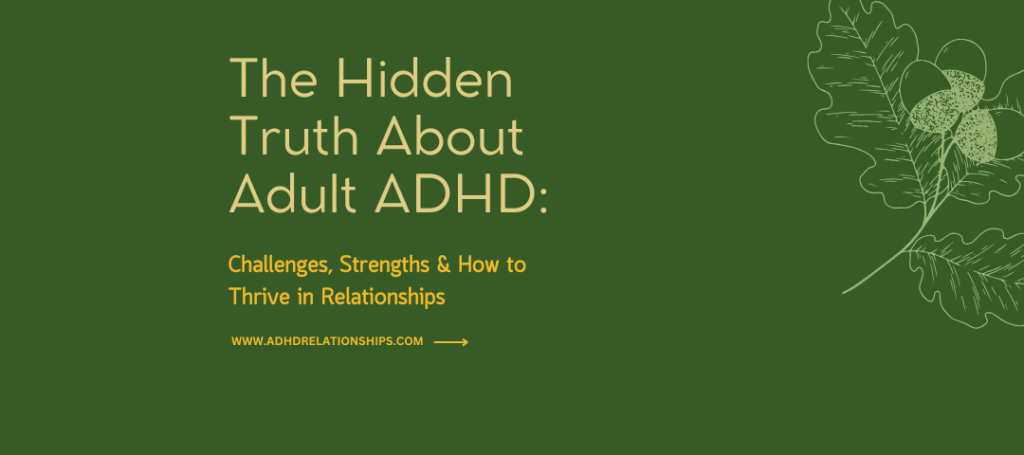
I’ve been invited to speak to a group of mental health professionals—psychologists, social workers, GPs, and psychiatrists—about a topic that is both deeply personal and profoundly misunderstood: Adult ADHD (Attention-Deficit/Hyperactivity Disorder).
With just an hour to speak, I asked myself: Should I focus on the neurological challenges? The emotional toll? The relationship damage? Or should I highlight the hidden strengths and untapped potential?
The answer is: all of the above—because Adult ADHD is complex, frustrating, and often misunderstood. But it’s also a gift—when properly understood and managed.
The Science: ADHD Is a Brain-Based Condition, Not a Character Flaw
Adult ADHD is not a personality quirk or a motivational issue. It’s a neurological condition, largely tied to dopamine dysregulation. It affects how we process information, make decisions, and manage impulses.
In the ADHD brain, new, exciting, or high-stimulation tasks light up the neural pathways—while mundane, repetitive tasks fall flat. That’s why we may be thrill-seeking, struggle with consistency, or procrastinate until the pressure hits. It’s not laziness—it’s wiring.
The Emotional Fallout: How ADHD Impacts Relationships
This wiring doesn’t just affect focus—it also affects how we show up in relationships. If you live with ADHD, you may relate to these situations:
- You speak without thinking, and later wonder why your partner is upset.
- You forget appointments or promises, not because you don’t care—but because your mind is juggling too much.
- You lash out in anger, then feel shame… or don’t even remember doing it.
- Your partner says, “You never listen,” but in your mind, you were listening—just on another channel.
ADHD can erode intimacy, build resentment, and create emotional disconnect in even the most loving relationships.
Inside the ADHD Mind: It’s Exhausting
Imagine a brain with a dozen thought streams playing simultaneously. Like flicking through TV channels, your mind constantly searches for the most stimulating input. That’s why:
- You lose track in conversations.
- You jump from task to task.
- You stay up late because your brain won’t “turn off.”
- You feel anxious most of the time—because every thought seems to end in a potential disaster.
And no matter how much you achieve, there’s a lingering belief that you’re underperforming. You feel a restlessness, a frustration, a sense of not living up to your potential. It’s not just mental—it’s emotional.
But Here’s the GOOD News: Adult ADHD Is a Superpower (When Managed Well)
Amidst the chaos, ADHD also comes with incredible strengths. Here’s what people with Adult ADHD bring to the table:
- 🔥 Energy & Zest for Life – We’re often passionate, fast-moving, and full of ideas.
- 🎯 Hyperfocus – When we’re interested, we can dive deep and produce amazing results.
- 💡 Creative Thinking – We see patterns others miss and come up with out-of-the-box solutions.
- 😂 Humour & Charisma – Many ADHDers are natural entertainers—quick-witted, spontaneous, and fun.
- 💪 Resilience & Persistence – We don’t give up easily, even when we probably should.
With the right support, people with ADHD can unlock their true potential and live more empowered, connected lives.
Managing ADHD to Rebuild Your Relationships
If you’re living with Adult ADHD—or love someone who is—managing it is key to saving relationships and improving emotional well-being. It’s not just about medication or therapy—it’s about developing emotional intelligence and daily strategies that work.
I help adults with ADHD to:
✅ Grow their emotional intelligence – because emotional skills matter more than time management.
✅ Discover their emotional style – to understand how they react in emotional situations.
✅ Rewire their emotional brain – by learning how ADHD affects emotional processing and how to take back control.
Final Word: Adult ADHD Is Real. It’s Manageable. And It Can Be a Strength.
Whether you’re a clinician, a partner, or an individual living with ADHD—understanding this condition is the first step toward healing, connection, and growth.
You can change your story, starting today.
I help ADHD adults not just survive—but thrive.
